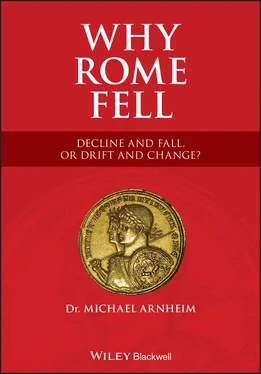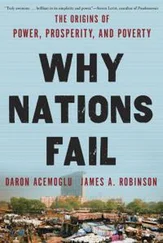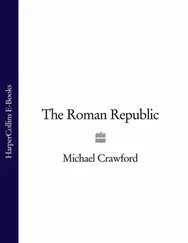Michael Arnheim - Why Rome Fell
Здесь есть возможность читать онлайн «Michael Arnheim - Why Rome Fell» — ознакомительный отрывок электронной книги совершенно бесплатно, а после прочтения отрывка купить полную версию. В некоторых случаях можно слушать аудио, скачать через торрент в формате fb2 и присутствует краткое содержание. Жанр: unrecognised, на английском языке. Описание произведения, (предисловие) а так же отзывы посетителей доступны на портале библиотеки ЛибКат.
- Название:Why Rome Fell
- Автор:
- Жанр:
- Год:неизвестен
- ISBN:нет данных
- Рейтинг книги:3 / 5. Голосов: 1
-
Избранное:Добавить в избранное
- Отзывы:
-
Ваша оценка:
- 60
- 1
- 2
- 3
- 4
- 5
Why Rome Fell: краткое содержание, описание и аннотация
Предлагаем к чтению аннотацию, описание, краткое содержание или предисловие (зависит от того, что написал сам автор книги «Why Rome Fell»). Если вы не нашли необходимую информацию о книге — напишите в комментариях, мы постараемся отыскать её.
Why Rome Fell: Decline and Fall, or Drift and Change?
Why Rome Fell
Why Rome Fell
Why Rome Fell — читать онлайн ознакомительный отрывок
Ниже представлен текст книги, разбитый по страницам. Система сохранения места последней прочитанной страницы, позволяет с удобством читать онлайн бесплатно книгу «Why Rome Fell», без необходимости каждый раз заново искать на чём Вы остановились. Поставьте закладку, и сможете в любой момент перейти на страницу, на которой закончили чтение.
Интервал:
Закладка:
In sum, Bibulus’s religiosity, whether genuine or feigned, is just an extreme example of a magistrate’s armory to check and balance a colleague’s actions—quite in keeping with the republican ethos of elite group power designed to prevent any one individual from becoming too powerful. Because of Caesar’s popularity among the masses, Bibulus’s attempts to block him backfired. When he opposed Caesar’s land redistribution bill, he found himself attacked by an irate mob, which broke his fasces (the bundle of rods and an axe that symbolized his authority as a consul) and pelted him with feces. (Plutarch, Cato the Younger , 32.2.)
Violent conflicts like this foreshadowed the impending demise of the republic, with three civil wars in quick succession, first between Caesar and Pompey, then, after Caesar’s murder, between the Caesarians and Caesar’s assassins (the latter fighting for the continuance of the old oligarchical order), and, finally, between the two leading Ceasarians, Marcus Antonius and Caesar’s heir, the future Augustus, who emerged as sole ruler of the Roman world after his victory over Antony at Actium in 31 BCE. But, before discussing the repercussions of this momentous event, let us take a step backward.
The Fall of the Republic
The last century of the Roman Republic was marked by confrontations between two groupings within the ruling oligarchy, one of which championed the cause, and depended on the support, of the lower classes, and the other, of a more “conservative” mindset, bent on the continued dominance of the senatorial elite. The terms “Populares” and “Optimates”, used by Cicero in Pro Sestio in 56 BCE to describe these two groups, tend now to be rejected by historians. However, here I agree with Lintott that, “As for optimates and populares , even though they came from the same social class with its framework of individual and family connexions, this is no reason to deny the divergence of ideology highlighted by Cicero,” with programs and leaders going back generations. Even if popularis politicians “…pursued their own interests more than those of the men they claimed to represent,….the mere possession of personal ambition does not disqualify a man from advancing the interests of others.” (Lintott, A., p. 52 f.)
The long-smouldering antagonism between the plebs urbana (the urban masses, not to be confused with the original plebeians involved in the so-called Conflict of the Orders) and the dominant elements in the Roman oligarchy eventually burst into flames over the radical agrarian reforms proposed by Tiberius Gracchus with popular support.
The Gracchi Brothers
In 133 BCE, Tiberius Gracchus, a member of the patricio-plebeian aristocracy, plebeian on his father’s side and patrician on his mother’s, was elected tribune of the plebs and immediately introduced an ambitious program of land reform entailing redistribution of land from wealthy nobiles to the urban poor. Tiberius Gracchus’s attempt to run for re-election was opposed by conservative senators, and violence erupted resulting in the clubbing to death of Gracchus and some 300 of his supporters.
Ten years later, in 123 BCE, Tiberius Gracchus’s brother Gaius Gracchus was also elected tribune of the plebs and attempted to revive his late brother’s program plus further measures to curb the power of the senatorial oligarchy. He had a broad base of support, made up not only of the urban poor but also of the agrarian poor and even some equites (equestrians, the wealthy class just below that of senator). However, his bid to extend Roman citizenship to non-Roman Italians cost him the support of a substantial number of the Roman urban poor, who were unwilling to share the privilege of Roman citizenship with outsiders. When Gaius Gracchus was defeated for re-election to the tribunate, there was a mass rally of his supporters on the Aventine Hill. The Senate declared a state of emergency by passing what is now termed a senatus consultum ultimum , and the pro-senatorial consul Lucius Opimius at the head of a force of armed supporters defeated Gaius Gracchus and his followers in a pitched battle. Gracchus committed suicide, and approximately 3,000 of his supporters were put to death in the proscriptions that followed.
Gaius Marius
The next popular leader was rather more successful. This was the great military reformer, a novus homo (new man) of equestrian origin, Gaius Marius, who was elected consul an unprecedented seven times between 107 and 86 BCE. Until the Marian reforms, only property owners were eligible to serve in the Roman army. What Marius did was to turn the Roman army into a professional standing army open to all citizens, no matter how poor. Soldiers were now recruited for an enlistment term of sixteen years. Marius’s reforms offered the landless masses the opportunity to become paid professional soldiers, an offer that was enthusiastically taken up. Retired soldiers were given a pension and a plot of land in conquered territory. Marius also extended Roman citizenship to citizens of the allied Italian cities in return for service in the Roman army. While creating a much improved Roman standing army, Marius’s reforms tended to transfer the troops’ loyalty from the state to their general.
Sulla
Lucius Cornelius Sulla, nicknamed Felix (Lucky), from an impoverished patrician background, who as quaestor (deputy commander) to Marius in the Jugurthine War managed by a stratagem to capture King Jugurtha himself in 105 BCE. But Marius and Sulla soon crossed swords, leading eventually to Sulla’s unprecedented march on Rome with his army in 88 BCE and again in 83 BCE. Sulla used his victory in 81 BCE to have himself appointed dictator legibus faciundis et reipublicae constituendae causa (dictator for the making of laws and for the settling of the constitution). This was the first time that Rome had a dictator since 202 BCE, but, unlike previous dictators, Sulla’s appointment was for an indefinite period. He held it for just over a year, using his power to enact some far-reaching constitutional reforms intended to strengthen the Senate against popular institutions, notably the tribunate of the plebs . He then resigned and retired into private life to write his memoirs and, if Plutarch is to be believed, to devote himself to debauchery (Plutarch, Sulla, 37). But no tinkering with the constitution could save the Republic. Sulla’s own career illustrated the fundamental truth that the future shape of the Roman government would be decided not by laws but by arms.
Pompey
The Roman Republic was now hurtling toward civil war, which was hastened by the fact that the Republic had become an unwieldy empire with trouble-spots needing urgent military attention. Sulla died in 78 BCE, and within less than ten years, most of his reforms would be rescinded by two of his former lieutenants on their return from successful military exploits: Gnaeus Pompeius, nicknamed Magnus and generally referred to in English as Pompey, and Marcus Licinius Crassus, one of the richest men in Rome, who were elected as joint consuls in 70 BCE.
Julius Caesar
The lineup for the final dénouement of the Republic took shape in 60 BCE, when the state was hijacked by an alliance between three strongmen in the so-called but unofficial First Triumvirate: Pompey, Crassus, and Caesar.
Gaius Julius Caesar was Marius’s nephew, and he remained true to his uncle’s populist politics. In Sulla’s final purge of Marian partisans in 83 BCE, the seventeen-year-old Caesar was spared only through the intervention of his mother’s family, which included supporters of Sulla and the Vestal Virgins because the young Caesar had been nominated as flamen Dialis (the high priest of Jupiter). In reluctantly sparing Caesar’s life, Sulla is said to have predicted that Caesar would prove the ruin of the aristocracy, “…for in that Caesar there are many Mariuses.”. (Suetonius, Julius , 1; Plutarch, Caesar , 1.)
Читать дальшеИнтервал:
Закладка:
Похожие книги на «Why Rome Fell»
Представляем Вашему вниманию похожие книги на «Why Rome Fell» списком для выбора. Мы отобрали схожую по названию и смыслу литературу в надежде предоставить читателям больше вариантов отыскать новые, интересные, ещё непрочитанные произведения.
Обсуждение, отзывы о книге «Why Rome Fell» и просто собственные мнения читателей. Оставьте ваши комментарии, напишите, что Вы думаете о произведении, его смысле или главных героях. Укажите что конкретно понравилось, а что нет, и почему Вы так считаете.












